The Islamic Golden Age stands as one of history’s most remarkable periods of scientific achievement, cultural vibrancy, and intellectual flourishing. Spanning from the 8th to the 14th centuries, this transformative era laid the foundation for the achievements of the 10 greatest Muslim scientists. These trailblazers reached extraordinary heights in astronomy, medicine, mathematics, chemistry, and more.
During this time, the 10 greatest Muslim scientists, Muslim scholars,islamic science heroes and their peers played a pivotal role in preserving the treasure troves of ancient knowledge from earlier civilizations such as Greece, Persia, and India. Not only did they safeguard these priceless works, but they also enhanced and expanded scientific understanding through groundbreaking research, experimentation, and innovation that continue to shape modern science.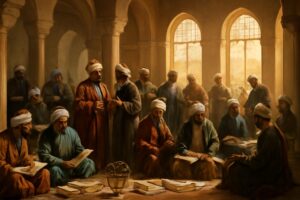
The groundbreaking contributions of these 10 greatest Muslim scientists bridged ancient and modern worlds, leaving a profound and lasting impact on both the Islamic world and Europe. Their legacy reshaped the foundations of global civilization, inspiring generations of scientists and thinkers worldwide.
﴿ وَقُل رَّبِّ زِدْنِي عِلْمًا ﴾
And say, “My Lord, increase me in knowledge.”
(Qur’an, 20:114)
It is crucial to recognize and honor the Muslim contributions to science by spotlighting the 10 greatest Muslim scientists. Doing so not only preserves the memory of their achievements but also serves as a testament to humanity’s shared pursuit of knowledge. Celebrating these Islamic science heroes helps restore a more complete and inclusive global science heritage.
10 Greatest Muslim Scientists
1. Al-Khwarizmi (c. 780–850 CE)
- Founder of Algebra: Developed algebraic methods and the concept of algorithms; “algebra” is named after his book Al-Kitab al-Mukhtasar fi Hisab al-Jabr wal-Muqabala.
- Numerical Innovation: Introduced Hindu-Arabic numerals that revolutionized mathematics and calculation.
- Astronomy & Geography: Improved astronomical tables and produced influential maps of the known world.

- Legacy: His books laid the foundation for mathematics in both the Islamic world and Europe, cementing his status in computer science history.
2. Ibn Sina (Avicenna) (980–1037 CE)
- Medicine: Wrote The Canon of Medicine, used as the main medical text in both East and West for centuries.
- Pharmacology & Anatomy: Combined hundreds of drugs, described intricate anatomy, and championed evidence-based medicine.
- Philosophy: Integrated Aristotelian philosophy into Islamic thought, influencing generations of philosophers.

- Medical Ethics: Highlighted ethics and standardized patient care models.
3. Ibn al-Haytham (Alhazen) (965–1040 CE)
- Pioneer of Optics: Proved that vision occurs when light bounces from an object and enters the eye, transforming optical science.
- Empirical Science: Applied experiments and observations, a precursor to the modern scientific method.

- Physics & Mathematics: Studied refraction, reflection, and mechanics; advanced understanding of lenses and camera obscura.
- Influence: Inspired Renaissance scientists, including Kepler, Newton, and Da Vinci.
4. Al-Razi (Rhazes) (865–925 CE)
- Medicine: Wrote Kitab al-Hawi, an encyclopedic medical reference of global influence.
- Chemistry: Classified minerals, animals, and plants, and organized chemical procedures in the lab.

- Hospital Practice: Founded the first hospitals with dedicated wards and rigorous hygiene protocols.
- Surgery: Invented new surgical techniques and instruments still in use in modified forms.
5. Al-Biruni (973–1048 CE)
- Astronomy: Measured Earth’s radius with great accuracy and devised advanced astronomical tables.
- Geography: Calculated latitude/longitude, and produced one of the earliest scientific explanations of the Earth’s rotation.
- Ethnography: Explored cultures and religions in Kitab al-Hind, advancing early anthropology.
- Mathematics: Formulated precise trigonometric tables and methods.
6. Ibn al-Nafis (1213–1288 CE)
- Anatomy: Described the pulmonary circulation of blood, correcting centuries of Galenic error.
- Medical Texts: Wrote expansive works on physiology, surgery, and the philosophy of medicine.
- Critical Science: Promoted careful verification, reinvigorating medical scholarship on the Islamic and Western worlds.
7. Jabir ibn Hayyan (Geber) (c. 721–815 CE)
- Father of Chemistry: Established systematic laboratory techniques such as distillation, crystallization, and evaporation.
- Acids & Compounds: Isolated acids (hydrochloric, nitric, citric, acetic) and described countless chemical substances.
- Lab Tools: Invented new scientific apparatus for chemical experimentation.
8. Al-Farabi (872–950 CE)
- Philosophy: United Aristotle, Plato, and Islamic philosophy, shaping logic, ethics, and metaphysics in the Muslim world.
- Political Science: Authored works on governance, civics, and social harmony.
- Music & Math: Formulated mathematical music theory that influenced Western and Eastern traditions.
- Logic: Advanced logical reasoning, underpinning future work in philosophy.
9. Ibn Rushd (Averroes) (1126–1198 CE)
- Philosophy: Wrote extensive commentaries on Aristotle, heavily influencing European and Islamic theology and philosophy.
- Medicine: Published key texts on diseases and therapeutics, still cited in medieval Europe.
- Jurisprudence: Expanded legal and ethical thought in Islam and Western philosophy.
- Astronomy: Made advances in planetary models and criticism of Ptolemaic astronomy.
10. Ulugh Beg (1394–1449 CE)
- Astronomy: Built the great Samarkand observatory and supervised precise stellar measurements.
- Star Catalog: Produced the Zij-i Sultani, the most accurate star catalogue of his age.
- Mathematics: Advanced trigonometry and improved astronomical tables.
- Mentorship: Fostered generations of mathematician-astronomers, cultivating a scientific renaissance in Central Asia.
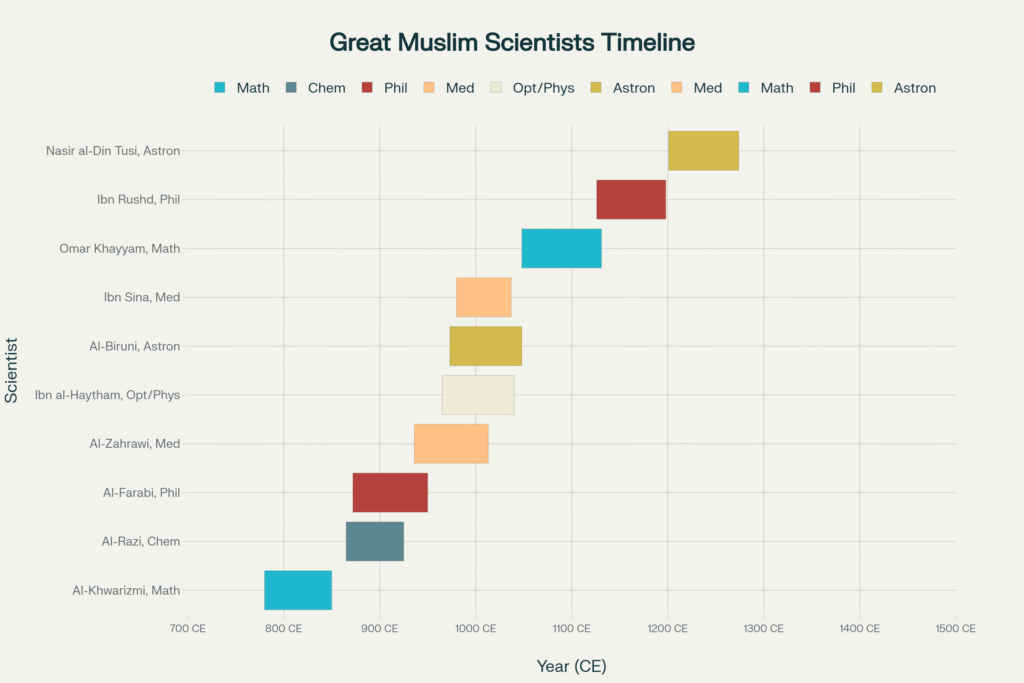
Additional Notable Mentions about Muslim scientists in history
- Al-Zahrawi (936–1013 CE):
Renowned as the “Father of Surgery”, he authored the influential Al-Tasrif, an encyclopedic medical guide introducing innovative surgical instruments and procedures. His detailed illustrations advanced surgery practices in both the Islamic world and Europe. - Al-Kindi (c. 801–873 CE):
Known as the “Philosopher of the Arabs”, he contributed to philosophy, mathematics, cryptography, and optics. Al-Kindi played a vital role in translating and synthesizing Greek philosophical works, and pioneered early scientific method and experimental approaches. - Mariam al-Asturlabi (10th century CE):
One of the earliest female astronomers and instrument makers, she specialized in designing and constructing astrolabes, complex instruments vital for astronomical calculations and navigation. - Al-Jazari (1136–1206 CE):
A master engineer and inventor, he wrote the Book of Knowledge of Ingenious Mechanical Devices, describing innovative water clocks, automata, and mechanical engineering concepts that anticipate modern robotics. - Ibn Khaldun (1332–1406 CE):
An influential historian and sociologist, author of the Muqaddimah, which pioneered theories in economics, social science, and historiography, shaping modern approaches to history and society. - Fatima al-Fihri (c. 800–880 CE):
Founder of the University of Al-Qarawiyyin in Fez, Morocco—one of the world’s oldest ,continually operating educational institutions, serving as a beacon for scientific and religious learning.
Legacy and Impact of famous muslim scientists
The legacy of Islamic science heroes is woven into the very fabric of modern scientific progress. By nurturing a culture of inquiry, creativity, and rigor, these pathfinders-muslim scientists in history laid the groundwork for many of today’s scientific disciplines. From the decimal number system and algebra to optics, pharmacology, and medical ethics, their discoveries form the core of contemporary knowledge.
﴿ هُوَ الَّذِي جَعَلَ لَكُمُ الْأَرْضَ ذَلُولًا فَامْشُوا فِي مَنَاكِبِهَا وَكُلُوا مِن رِّزْقِهِ ۖ وَإِلَيْهِ النُّشُورُ ﴾
“It is He who made the earth tame for you – so walk among its slopes and eat of His provision – and to Him is the resurrection.” (Qur’an, 67:15)
Their knowledge and translations revitalized and illuminated the European Renaissance, fueling the Scientific Revolution. Islamic scientific texts, meticulously preserved and translated into Latin, became the bedrock of European education. Luminaries like Al-Khwarizmi, Ibn Sina, and Ibn al-Haytham directly shaped the works of Copernicus, Galileo, Newton, and other giants.
The enduring impact of these Muslim famous scientists,muslim scholars and visionaries is most evident in the continuous evolution of education, research, and innovation. Their spirit lives on in universities and research centers around the globe, reminding us that curiosity and collaboration have no borders.
قَالَ النَّبِيُّ ﷺ:
“مَنْ دَلَّ عَلَى خَيْرٍ فَلَهُ مِثْلُ أَجْرِ فَاعِلِهِ”The Prophet ﷺ said: “Whoever guides someone to goodness will have a reward like one who did it.”
(Sahih Muslim 1893)
Today, the world continues to benefit from this brilliant scientific heritage. By celebrating and learning from these achievements, we honor a vibrant legacy and kindle inspiration for generations to come.
Frequently Asked Questions
About the 10 Greatest Muslim Scientists
References
- Saliba, G. (2007). Islamic Science and the Making of the European Renaissance . MIT Press.
- Turner, H.R. (1997). Science in Medieval Islam: An Illustrated Introduction . University of Texas Press.
- Sarton, G. (1927–1948). Introduction to the History of Science (Vols. I–III) . Carnegie Institution of Washington.
- Encyclopaedia Britannica: Al-Khwarizmi, Ibn Sina (Avicenna), Ibn al-Haytham, and others.
- Stanford Encyclopedia of Philosophy: Al-Khwarizmi, Avicenna (Ibn Sina), Ibn al-Haytham, Ibn Rushd (Averroes)
- The British Library. Science and Islam – Digital Exhibition .
- National Geographic Society. How Early Islamic Science Advanced Medicine, Math, and Astronomy .
- World History Encyclopedia. Islamic Golden Age .
- BBC History. Science in the Golden Age of Islam .
- Harvard University Library. Islamic Heritage Project .
- The Qur'an, 20:114 and 58:11. Surah Taha 20:114, Surah Mujadila 58:11.
- Collections of Hadith: Sunan Ibn Majah 224, Sahih Muslim 1893, Jami` at-Tirmidhi 2687

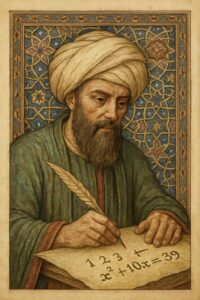
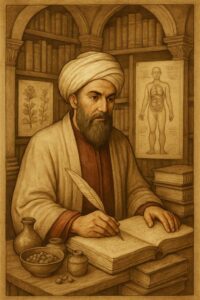
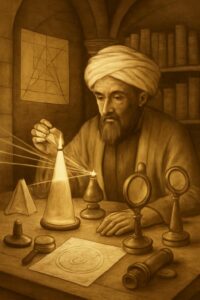
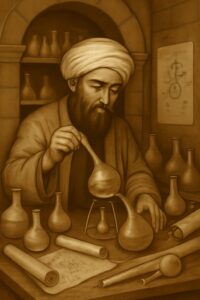


Masallah….. This is very helpful to everybody to know about our great scientists .
Pingback: Muslims Scientist and Researcher - abdulpuncharwala.com
I am not sure where you are getting your info, but great topic. I needs to spend some time learning much more or understanding more. Thanks for wonderful info I was looking for this info for my mission.